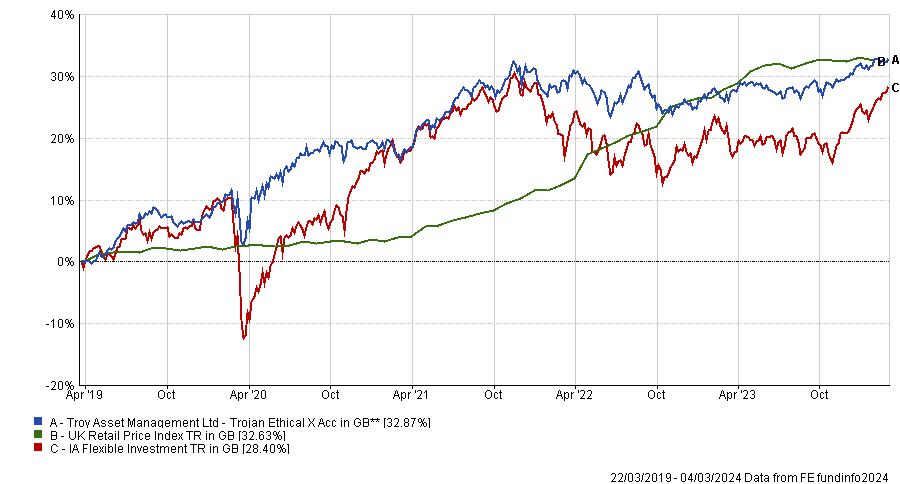Investors and asset allocators often want to gain an edge by researching undiscovered or under-appreciated strategies. Funds managed by women arguably fit that description due to their scarcity. Just 12% of investment trusts and funds are run by women but that slender statistic masks a wealth of expertise and experience that merit closer attention.
To celebrate International Women’s Day, Trustnet asked female fund selectors to recommend investment strategies managed by women.
Claudia Calich, M&G Emerging Markets Bond
Tillit’s chief executive officer (CEO) Felicia Hjertman recommended the M&G Emerging Markets Bond fund, which is one of the most unconstrained in its peer group and can invest across government and corporate bonds, denominated in US dollars and local currencies. It is a best ideas fund with decisions based on a combination of top-down views and bottom-up fundamental credit analysis.
Hjertman said the $2bn fund has a “fabulous track record”. It is a top-quartile performer over three and five years within the Investment Association’s Global EM Bonds – Blended sector.
Claudia Calich, M&G’s head of emerging market debt, has extensive experience. She joined M&G 10 years ago from Invesco, where she also led the emerging market debt team, and began her investment career in 1993 as an emerging markets fixed income analyst with Thomson Reuters.
Charlotte Yonge, Trojan Ethical
Trojan Ethical led by Charlotte Yonge is a multi-asset fund that offers downside protection with an ethical overlay.
Hjertman, who recommended the fund, said that Yonge and her colleagues at Troy Asset Management “really stick to their knitting”.
“They really care about downside protection. It’s easy to get carried away with the tech stuff and the sexy stuff and Troy just hasn’t.”
Yonge comes across as thoughtful, committed, articulate and passionate about the way Troy invests, Hjertman added.
The fund was launched in 2019, since when it has beaten both the average IA Flexible Investment sector peer and the UK Retail Prices Index benchmark, as the below chart shows.
Performance of fund vs sector and benchmark since launch

Source: FE Analytics
Georgina Brittain, JPMorgan UK Small Cap Growth & Income
Georgina Brittain has been running the JPMorgan UK Small Cap Growth & Income trust for 25 years, with Katen Patel appointed as co-manager nine years ago. The trust recently merged with JPMorgan Mid Cap, which has increased its scale, providing cost saving advantages.
As with many investment trusts, however, it is on a wider than usual discount as the UK market has fallen from grace in recent years, with investors looking overseas for returns.
Emma Bird, head of investment trusts research at Winterflood, said: “We believe the current discount of 15% offers an attractive entry point as we see scope for this to narrow if sentiment towards UK small-caps turns more positive and the fund is able to raise its profile post-merger.
“The concurrent introduction of an enhanced dividend policy may also act as a catalyst for a re-rating and makes good use of the closed-ended fund structure.”
The trust has a "stable and consistent investment approach, supported by the longevity of the management team,” Bird continued.
“The managers’ investment approach involves building conviction in a company based on its track record, with the team’s confidence in a stock growing as it consistently meets or beats market expectations. The managers undertake deep and regular analysis across the portfolio in an attempt to mitigate risk.”
Ailsa Craig, International Biotechnology Trust
Charlotte Cuthbertson, co-manager of the MIGO Opportunities Trust, chose the International Biotechnology Trust (IBT). Biotech is a dynamic sector with considerable growth potential, marked by rapid advancements. The sector is coming out of a long bear market and as such it is “ripe with undervalued opportunities”, she said.
IBT invests across both established and emerging companies, which has allowed it to capitalise on trends that others may overlook.
“In a sector known for its volatility, Ailsa Craig’s expertise and resilience particularly shine. Her biological insight and investment acumen, alongside her co-manager Marek Poszepczynski, have been crucial in navigating the complexities of the biotech sector with precision,” Cuthbertson said.
Leda Braga, Schroder GAIA BlueTrend
The $340m Schroder GAIA BlueTrend fund employs a systematic trend-following strategy, trading futures across 150 liquid markets worldwide. It capitalises on opportunities where prices exhibit persistent trends, whether upward or downward, and can take a net long or short position in any asset class.
The strategy originated in 2004 at BlueCrest and later moved to Systematica Investments in January 2015. Leda Braga, founder and CEO of Systematica, manages the fund.
Emma Saunders, acting head of collectives at Rathbones Investment Management, said: “The fund has a compelling long-term track record and has a strong history of providing protection during stress markets owing to its low correlation.”
In 2022 when global equity markets faced significant declines, the fund posted an impressive 45.6% gain, “driven by rising rates (the fund was short fixed income), rising commodity prices, and holding a long position in the US dollar amid inflationary pressures”, she said.
The fund's monthly performance can be “lumpy” and drawdowns could be substantial due to its high volatility target, Saunders pointed out. Therefore, this strategy is best suited to portfolios with a long-term investment horizon.
Indeed, since 2015 the fund has made a 45.8% return, beating the FO Hedge/Stru Prod – Mixed peer group average of 27.2%, although it sits in the third quartile of the sector over this period.




